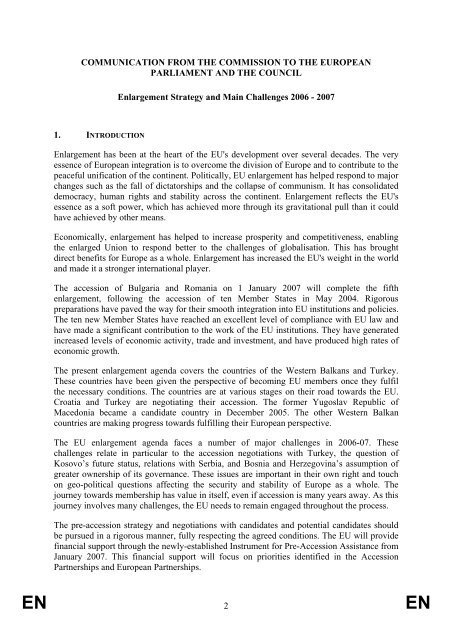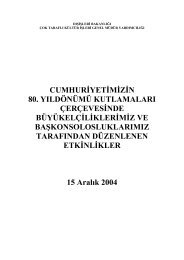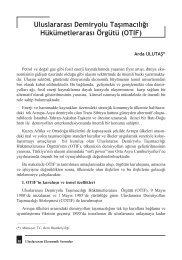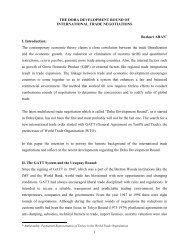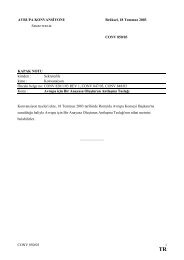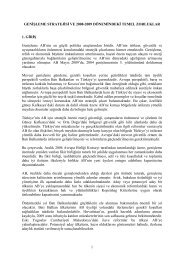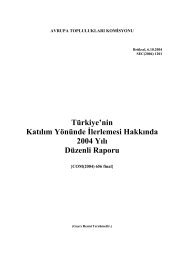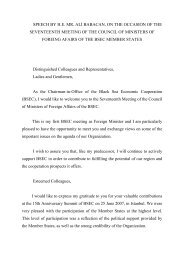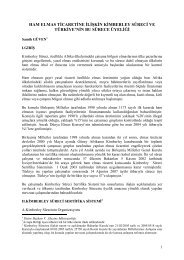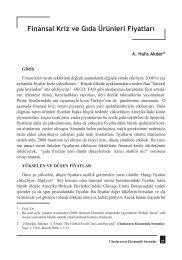Enlargement Strategy and Main Challenges 2006 - 2007
Enlargement Strategy and Main Challenges 2006 - 2007
Enlargement Strategy and Main Challenges 2006 - 2007
Create successful ePaper yourself
Turn your PDF publications into a flip-book with our unique Google optimized e-Paper software.
COMMUNICATION FROM THE COMMISSION TO THE EUROPEAN<br />
PARLIAMENT AND THE COUNCIL<br />
1. INTRODUCTION<br />
<strong>Enlargement</strong> <strong>Strategy</strong> <strong>and</strong> <strong>Main</strong> <strong>Challenges</strong> <strong>2006</strong> - <strong>2007</strong><br />
<strong>Enlargement</strong> has been at the heart of the EU's development over several decades. The very<br />
essence of European integration is to overcome the division of Europe <strong>and</strong> to contribute to the<br />
peaceful unification of the continent. Politically, EU enlargement has helped respond to major<br />
changes such as the fall of dictatorships <strong>and</strong> the collapse of communism. It has consolidated<br />
democracy, human rights <strong>and</strong> stability across the continent. <strong>Enlargement</strong> reflects the EU's<br />
essence as a soft power, which has achieved more through its gravitational pull than it could<br />
have achieved by other means.<br />
Economically, enlargement has helped to increase prosperity <strong>and</strong> competitiveness, enabling<br />
the enlarged Union to respond better to the challenges of globalisation. This has brought<br />
direct benefits for Europe as a whole. <strong>Enlargement</strong> has increased the EU's weight in the world<br />
<strong>and</strong> made it a stronger international player.<br />
The accession of Bulgaria <strong>and</strong> Romania on 1 January <strong>2007</strong> will complete the fifth<br />
enlargement, following the accession of ten Member States in May 2004. Rigorous<br />
preparations have paved the way for their smooth integration into EU institutions <strong>and</strong> policies.<br />
The ten new Member States have reached an excellent level of compliance with EU law <strong>and</strong><br />
have made a significant contribution to the work of the EU institutions. They have generated<br />
increased levels of economic activity, trade <strong>and</strong> investment, <strong>and</strong> have produced high rates of<br />
economic growth.<br />
The present enlargement agenda covers the countries of the Western Balkans <strong>and</strong> Turkey.<br />
These countries have been given the perspective of becoming EU members once they fulfil<br />
the necessary conditions. The countries are at various stages on their road towards the EU.<br />
Croatia <strong>and</strong> Turkey are negotiating their accession. The former Yugoslav Republic of<br />
Macedonia became a c<strong>and</strong>idate country in December 2005. The other Western Balkan<br />
countries are making progress towards fulfilling their European perspective.<br />
The EU enlargement agenda faces a number of major challenges in <strong>2006</strong>-07. These<br />
challenges relate in particular to the accession negotiations with Turkey, the question of<br />
Kosovo’s future status, relations with Serbia, <strong>and</strong> Bosnia <strong>and</strong> Herzegovina’s assumption of<br />
greater ownership of its governance. These issues are important in their own right <strong>and</strong> touch<br />
on geo-political questions affecting the security <strong>and</strong> stability of Europe as a whole. The<br />
journey towards membership has value in itself, even if accession is many years away. As this<br />
journey involves many challenges, the EU needs to remain engaged throughout the process.<br />
The pre-accession strategy <strong>and</strong> negotiations with c<strong>and</strong>idates <strong>and</strong> potential c<strong>and</strong>idates should<br />
be pursued in a rigorous manner, fully respecting the agreed conditions. The EU will provide<br />
financial support through the newly-established Instrument for Pre-Accession Assistance from<br />
January <strong>2007</strong>. This financial support will focus on priorities identified in the Accession<br />
Partnerships <strong>and</strong> European Partnerships.<br />
EN 2 EN


